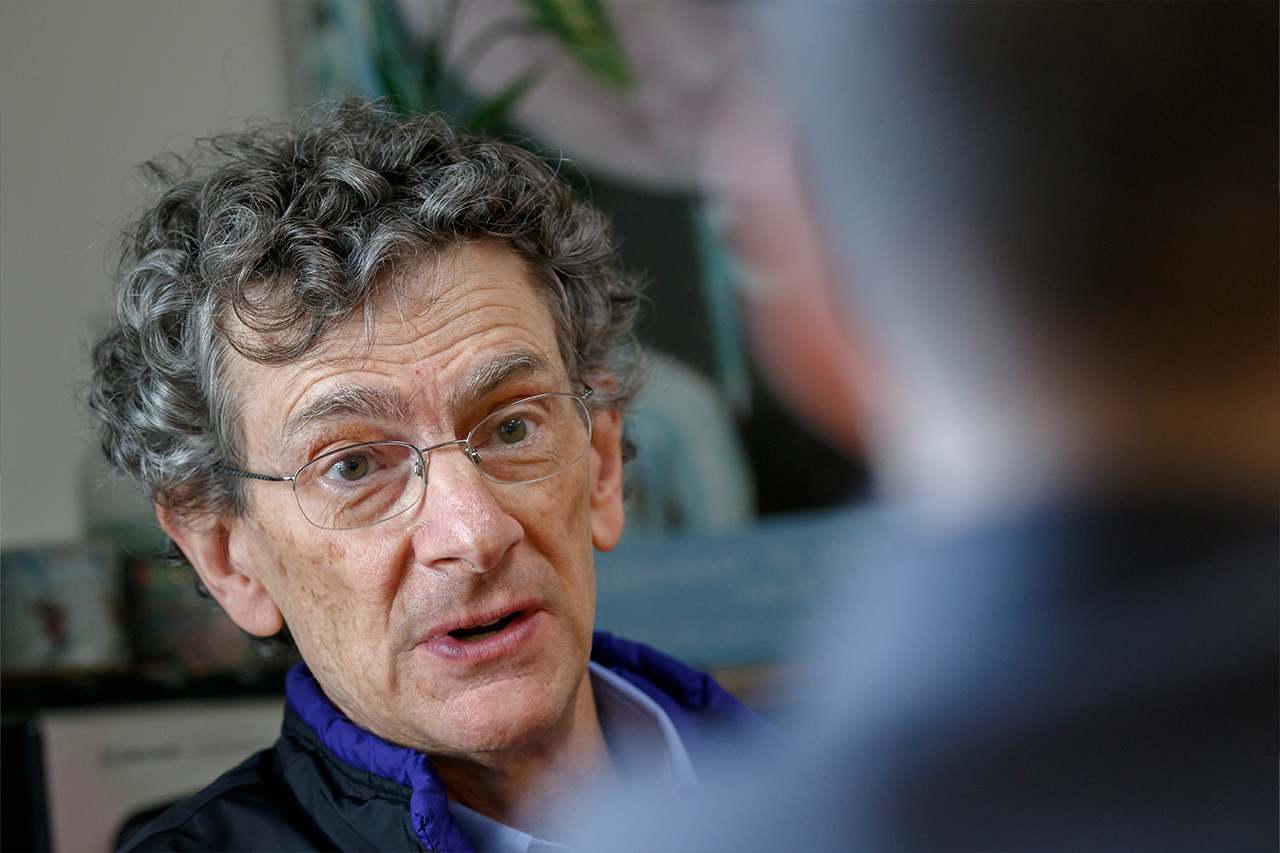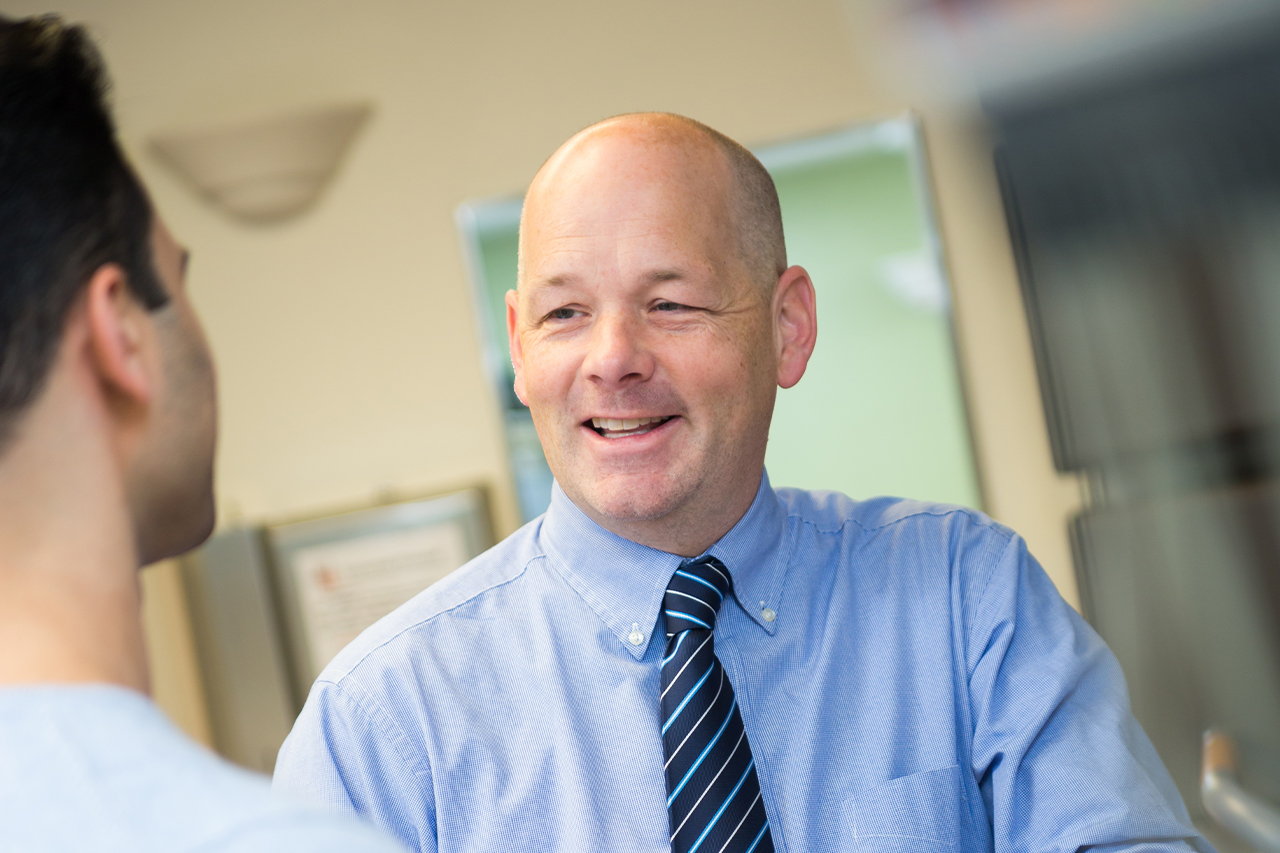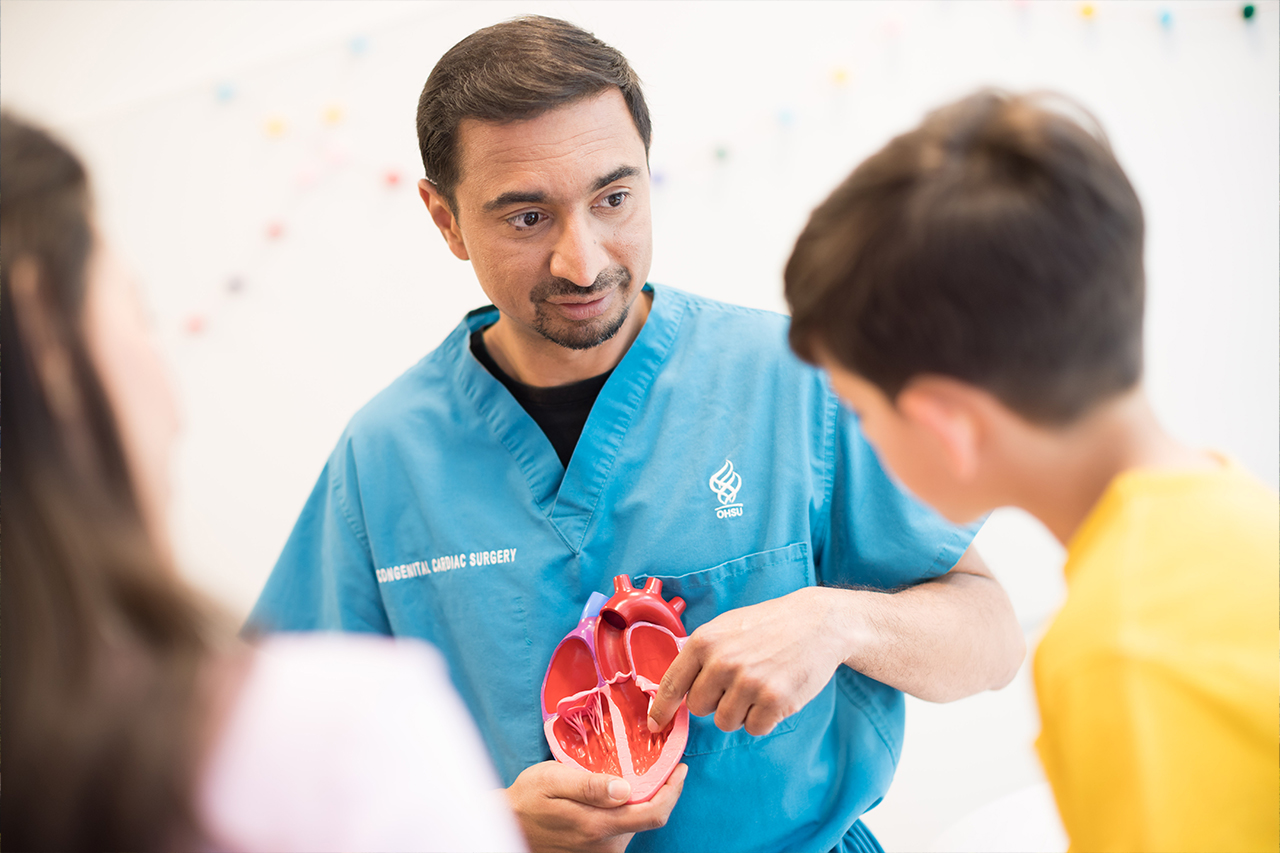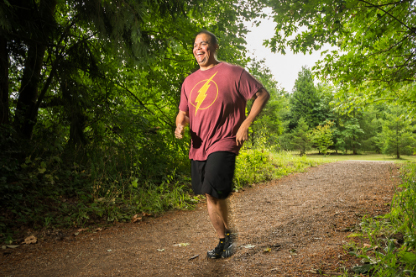Oregon Health & Science University
CARDIOVASCULAR HEALTH
Joining Forces for Lifelong Heart Care
Heart care at OHSU starts before birth and lasts throughout life, and now it’s all under the umbrella of Oregon’s top-ranked heart center.
OHSU’s Knight Cardiovascular Institute (KCVI) expanded its care in 2022 to patients at OHSU Doernbecher Children’s Hospital and the Portland VA Medical Center.
The change makes it easier for specialists from those hospitals to provide leading-edge care for heart and blood vessel diseases at all stages. With the Knight Cardiovascular Institute’s support, providers work as a team to make patients’ transitions from prenatal to pediatric to adult heart care as seamless as possible.
Coordinating heart care from pregnancy through adulthood matters because many heart problems develop in the fetus and continue for a lifetime.
Thanks to medical and surgical advances, more than 90% of children born with heart conditions survive into adulthood. They need specialized follow-up care for their whole lives, says Craig Broberg, M.D., who leads OHSU’s Adult Congenital Heart Disease program.
Coordinating heart care from pregnancy through adulthood matters because many heart problems develop in the fetus and continue for a lifetime.
Thanks to medical and surgical advances, more than 90% of children born with heart conditions survive into adulthood. They need specialized follow-up care for their whole lives, says Craig Broberg, M.D., who leads OHSU’s Adult Congenital Heart Disease program.
But many of those children don’t come back for routine heart care as adults and could miss problems that might be developing, Broberg says. Looming problems might include the need for a valve replacement or pacemaker, heart rhythm issues, or risks during pregnancy. OHSU’s associate chief of clinical cardiology, Abigail Khan, M.D., M.S.C.E., and cardiologist Lidija McGrath, M.D., have been studying factors in how adults gain appropriate access to specialized care.
To reduce lapses in treatment, the adult and children’s heart teams have worked together to help guide children to adult care. The teams educate children about their conditions and need for long-term care. Pediatric and adult heart surgeons partner to track patients and plan their care. And a nurse follows teens as they switch to the adult clinic.
“We want to get to know them,” Broberg says. “We want to gain their trust as their pediatric cardiologists have. We want to continue to follow them for years to come. And we want to find small problems before they become big problems.”
To reduce lapses in treatment, the adult and children’s heart teams have worked together to help guide children to adult care. The teams educate children about their conditions and need for long-term care. Pediatric and adult heart surgeons partner to track patients and plan their care. And a nurse follows teens as they switch to the adult clinic.
“We want to get to know them,” Broberg says. “We want to gain their trust as their pediatric cardiologists have. We want to continue to follow them for years to come. And we want to find small problems before they become big problems.”
OHSU’s heart care lasts for a lifetime and sometimes crosses generations, says Frederick A. Tibayan, M.D., who leads the surgery team in the advanced Heart Failure and Transplant program.
“I hope that it is helpful for families to know their caregivers have that perspective,” Tibayan says. “If you have a young person, you’re not just trying to bridge them to get them to their 25th birthday. You have a team that’s trying to get them into their 60s and 70s and beyond.”
The Knight Cardiovascular Institute helps heart experts bring the latest research to care at every level, starting with fetal heart care.
Specialists in maternal, fetal and newborn care work together to find and treat complex heart problems before and after delivery. They track babies with heart conditions in their first year to make sure they get the care they need.
Prenatal care makes a difference in adult heart health, says George Giraud, M.D., Ph.D., interim chief of cardiology at the Portland VA Medical Center.
“I hope that it is helpful for families to know their caregivers have that perspective,” Tibayan says. “If you have a young person, you’re not just trying to bridge them to get them to their 25th birthday. You have a team that’s trying to get them into their 60s and 70s and beyond.”
The Knight Cardiovascular Institute helps heart experts bring the latest research to care at every level, starting with fetal heart care.
Specialists in maternal, fetal and newborn care work together to find and treat complex heart problems before and after delivery. They track babies with heart conditions in their first year to make sure they get the care they need.
Prenatal care makes a difference in adult heart health, says George Giraud, M.D., Ph.D., interim chief of cardiology at the Portland VA Medical Center.

“If you have a young person, you’re not just trying to bridge them to get them to their 25th birthday. You have a team that’s trying to get them into their 60s and 70s and beyond.”

George Giraud, M.D., Ph.D., is a specialist in cardiovascular medicine whose clinical activities range from the cardiac catheterization and echocardiography laboratories to the outpatient cardiology clinic.
That’s because stress in the uterus can cause heart problems. For instance, hypertension, the stress hormone cortisol, or undernutrition can cause the fetal heart to stop producing heart cells. When that happens, the baby has fewer heart cells at birth and for life.
Giraud studies the fetal origins of adult heart disease in KCVI’s Center for Developmental Health. He also sees a full range of heart conditions in his clinical work with veterans, who often come from underserved communities.
The Knight Cardiovascular Institute’s expansion will help him collaborate with colleagues across the three hospitals, he says.
“Our success has been in bringing people together with their expertise,” he says. “It’s all of us working together.”
Giraud studies the fetal origins of adult heart disease in KCVI’s Center for Developmental Health. He also sees a full range of heart conditions in his clinical work with veterans, who often come from underserved communities.
The Knight Cardiovascular Institute’s expansion will help him collaborate with colleagues across the three hospitals, he says.
“Our success has been in bringing people together with their expertise,” he says. “It’s all of us working together.”
PREVENTIVE CARDIOLOGY
Treating Obesity as a Chronic Disease
OHSU cardiologists are reframing obesity as a chronic disease that should be managed like any other medical condition.
CARDIOGENIC SHOCK
Saving More Lives with a Cardiogenic Shock Team
When every minute counts, cardiovascular sub-specialists pull out all the stops to support patients with this life-threatening condition.




